
Mining & Trade News
Malawi Online News
Top Stories

Energy
Tedzani IV ahead of schedule despite Covid-19 woesMay 29, 2020 / Tawonga Nyirenda Mayuni
The Electricity Generation Company (EGENCO) says construction of Tedzani IV Hydropower plant is ahead of schedule despite coronavirus disease (COVID-19) woes.
EGENCO says in a statement posted on its Facebook page that boarder restrictions imposed by a number of countries as a containment measure against the pandemic is making it difficult for the company to import equipment for the project.
However, EGENCO states that if the situation improves and equipment starts flowing into the country smoothly, the project will be completed way ahead of time.
“Currently, 84% of the works at the Tedzani hydropower plant have been finished, and the contractor is engaged in final power house civil works, continuing spiral case and turbine installations,” reads the statement from the power utility.
The project is scheduled to be commissioned in September 2021 but EGENCO says with the outstanding progress being made, the 18MW plant may be commissioned in February 2021, all things being equal.
The project is being financed using proceeds of a Japanese grant of US$52-million while EGENCO is contributing US$4.8-million.
Japanese contractor Mitsubishi Corporation is executing the civil works for the power plant in a joint venture arrangement with Calik Enerji of Turkey.

Energy
Petroleum policy awaits cabinet approvalMay 18, 2020 / Wahard Betha
The Ministry of Natural Resources and Mining says it has finalised working on the draft upstream petroleum policy, and the document will soon be submitted to Cabinet for final deliberation and approval.
Head of Oil and Gas Desk at the Ministry Cassius Chiwambo told Mining & Trade Review that the draft Petroleum Policy has already been approved by the Principal Secretary’s Committee on Natural Resources and Mining.
Chiwambo said: “Government with technical support from the Commonwealth Secretariat conducted a series of consultative meetings in the country that attracted views from the public that were used as key instructions for the development of the draft policy.”
“Meanwhile, the Government finished working on the Draft Policy and we are just waiting for the Ministry’s wish that the Draft Policy be tabled by the Cabinet Committee as soon as the Committee meets.”
To ensure that the Draft Policy meets both domestic and international standards, Chiwambo explained that the Government conducted further review and legal consultations on policy issues that seem to be in conflict with entire Laws of Malawi and international best practice.
Chiwambo said the Policy has been crafted to ensure that there is a win-win situation between Malawi and multinational oil exploration and production firms.
“The Draft Petroleum Policy cites quite a number of national fundamental principles such as Resource Ownership and Development, Local Participation, Local Content (Proposing for a Local Content Policy) issues; including Corporate Social Responsibility, Environmental Standards, Transparency Issues and Measures, Capacity Development and many others,” he said.
Chiwambo said in the drafting process, the Ministry considered the Triple Bottom-line Principle as per the technical and legal advice submitted to Government of Malawi by the International Atomic Energy Agency (IAEA) Special Resource Classification Team in 2015.
He said the technical and legal advices focused on the three axis of Geological, Socio-Economic Development and Feasibility.
“Looking at some of the areas which are considered in the Policy, we can see that both Multinational Cooperatives (MNCs) and Malawians will benefit a lot. It is the desire of Malawi Government to ensure a win-win take as supported by the African Mining Vision (AMV) and the Agenda 2063 of Sustainable Development Goals (SDGs),” he said.
Malawi’s part of the Great African Rift Valley is classified as a potential area for oil exploration following the discovery of oil in countries such as Rwanda, which are part of the geological set up.
The Malawi Government divided the area into six oil prospecting blocks that were awarded to multinational exploration firms. The government awarded Block 1 located in Chitipa and part of Karonga to Efora Energy formerly SacOil, Block 2 and 3 located in Karonga, Nkhata Bay and Nkhotakota to Hamra Oil, Block 4 and 5 located in Dedza, Mangochi, Balaka and Machinga to Rak Gas and Block 6 located in lower shire to Pacific Oil and Gas.
However, Efora Energy and Pacific Oil and Gas later relinquished their licenses. Chiwambo said government will issue the licenses for the two blocks to interested investors in line with the international best practices and desirable standards that were proposed by Malawians during the consultative forums and many other information sourcing streams.
“The Ministry plans to release another advert to identify new investors for these blocks once it is ready,” he said.
The Ministry is also working on reviewing the Petroleum (Exploration and Production) Act of 1983 which is considered outdated as it was drafted before the country planned to go into petroleum exploration and production.
Chiwambo explained that the process of reviewing the Act commenced some years back, and the Ministry is now at an advanced stage in executing the process.
He said: “The Ministry with technical support from Commonwealth Secretariat conducted a diagnostic assessment of the current Act to identify gaps in it, and several issues were identified for reform in light of the Policy (Draft) and international best practices.”
“The new Act will ensure harmonization with the principles enshrined in the Policy (Draft), the African Mining Vision and international best practices for the sustainable management of natural resources. These principles are capable of supporting the government to achieve the Sustainable Development Goals (SDGs) and the Agenda 2063.”
He said in the coming Act, resource ownership will be vested in the state of behalf of the people on Malawi while in the existing Law of 1983, it is vested in the Life President on behalf of the people of Malawi.
“In the new Act, the entire property of petroleum, in, under or upon any land or waters in Malawi will be vested in the Republic; but without prejudice to the exercise of any right under or pursuant to the Act.”
The new Petroleum Act will also address issues to do with transparency and accountability, good governance, balanced fiscal regime, maximization of local content and environmental sustainability among several other issues.
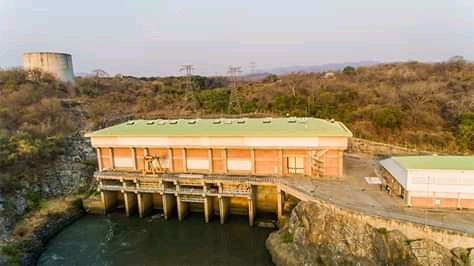
Energy
COVID-19 DELAYS SHIPMENT OF KAPICHIRA POWER STATION SPARE PARTSMarch 30, 2020 / Bester Kayaye
EGENCO says it is uncertain on when one of its four machines at Kapichira Power Station will get back online as its spare parts are failing to find a flight through which they can be shipped from Germany due to the Corona Virus outbreak, which has culminated into the suspension of many international flights.
This was revealed on Friday March 27 during a familiarisation tour of the power Station by the newly appointed Minister of Energy Atupele Muluzi.
Egenco CEO William Liabunya said the power generation company is currently maintaining two machines at Kapichira site that contribute 64.8MW to the national grid but spare parts for one of the machines are failing to arrive in the country from Germany where they were manufactured due to cancellation of flights amidst COVID-19 pandemic.
Liabunya said: “The company ordered some spare parts to be manufactured in Germany, and we are told that they are ready, but due to the pandemic it has been difficult to transport the parts into the country, and we were also anticipating commissioning engineers for these parts to come from Germany whose travel depends on the COVID-19 situation,” he said.
“The pandemic has also affected the country’s power construction projects including Likoma and Chidzumulu Island Solar hybrid projects which have been halted as the contractor is from China and is failing to ship in some required equipments.”
However, Liabunya said EGENCO is, currently, installing repaired parts of one machine that underwent specialized repairs in South Africa and arrived in the country on Wednesday March 25.
“At least we are on course of installing repaired parts for one of the machines that have arrived in the country before movement restrictions were effected in South Africa and we are expecting to complete this task within the next 10 days, where upon its completion 32.4MW will be added to the national grid,” he said.
Meanwhile Egenco is set to review its quarterly strategic plan, in which among others, it is to table various power projects including Salima Solar and Kamwamba Coal fired.
Muluzi commended EGENCO’S efforts made to install and repair malfunctioning machines which he said will help to mitigate load shedding.
“It was extremely important as a Minister of Energy to ascertain what is really causing continued blackouts in the country but good news is that parts are in, being fitted and an additional 32.4MW will be added to national grid in the course of a week or so,” he said.
Muluzi reiterated that his Ministry is also working with ESCOM and other key stakeholders to find long lasting solutions to load shedding as well as ensure more reliable power.
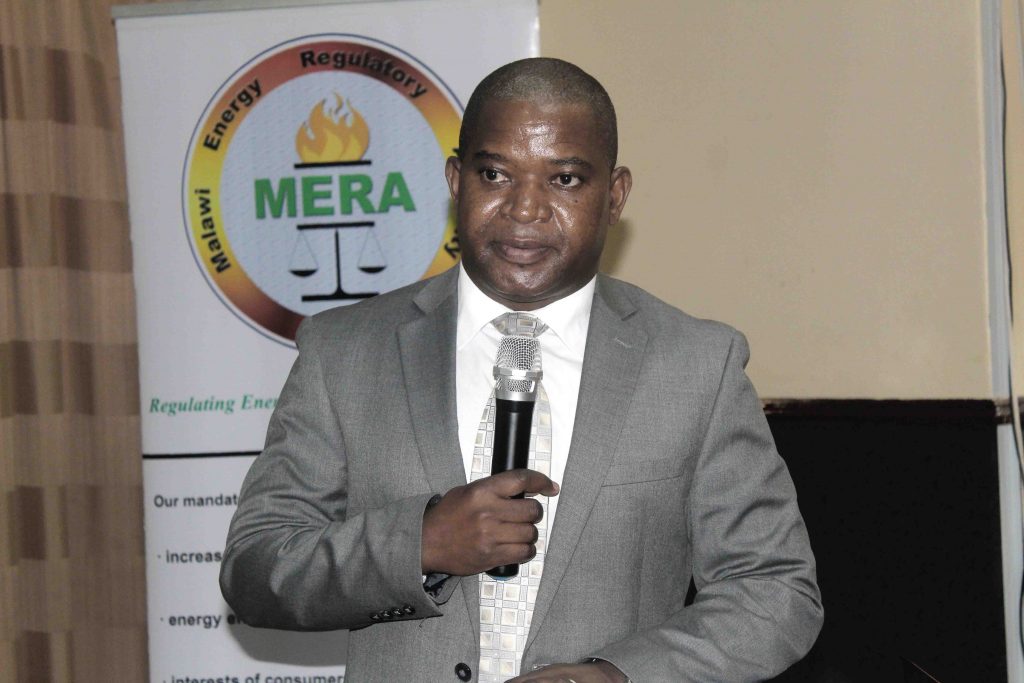
Energy
MERA assures Malawians of sufficient fuel supply despite COVID-19 threatMarch 27, 2020 / Wahard Betha
In the wake of the Covid-19 outbreak which has prompted countries to close boarders in so doing disrupting imports of essential commodities, the Malawi Energy Regulatory Authority (MERA) saysMalawi has sufficient internal fuel stock cover for approximately two months.
In a statement issued on its Facebook page, CEO for MERA Collins Magalasi explains that the country has sufficient petrol stock cover equivalent to 43 days and diesel of up to 83 days.
Magalasi says: “MERA would like to inform the public that the country continues to receive Liquid Fuels and Gas (LFG) from the ports of Beira, Nacala and Dar es Salaam without restraint; and stakeholders in the fuel supply industry are alert to ensure an effective and efficient response to any impending disruption to LFG supply.”
He says although the country has not registered any case of Covid-19, the pandemic requires a strategic approach in preparedness, management and recovery of a potential fuel and gas supply disturbance.
Magalasisays as one way of fighting the virus, MERA has activated the National Emergency Response Plan that will involve working with the National Liquid Fuels and Gas Emergency Management Committee and Operations Management Group which are provided in the response plan.
He applauds all key stakeholders and players in the fuel sector for their rolein facilitating sufficient fuel stock in Malawiwhile the country is under the threat of the pandemic.
“MERA thanks all fuel importers, transporters, oil marketing companies, retailers, government ministries and departments, banks and all stakeholders for the great coordinated approach that has been taken and resulted in our country having healthy fuel stocks at a time that the world is under the coronavirus threat,” he says.
Magalasipledges to continue updating the public of the fuel supply situation in the country when necessary.
The COVID-19 pandemic has resulted in the declining of fuel prices on the international market forcing countries like Malawi to lower its fuel prices.
MERA recently slashed diesel prices from K924 per litre to K887 per litre while the price of paraffin was reduced from K710 to K693 per litre but that of petrol has been maintained at K930 per litre.
The Authority stated that the changes in the prices of diesel and paraffin were in line with the Automatic Pricing Mechanism (APM) where the two fuel’s landed costs were beyond the plus minus five percent trigger limit.
Malawi Government’s strategic fuel reserves have a storage capacity of 60-million litres translating to 60 days’ stock cover, and there are plans to raise the capacity to 90-million litres thus 90 days of fuel stock cover.

Energy
German firm to review Kammwamba Power Plant StudyMarch 17, 2020 / Madalitso Mhango
Electricity Generation Company of Malawi (EGENCO) has contracted German Company Fichtner GmbH to execute consultancy services to review and update the feasibility study for Kammwamba Coal Fired Power Plant in Neno.
EGENCO says in a statement that Fichtner emerged a preferred consulting firm for the assignment after submitting a Unit Price for the contract of 925,536 Euros.
The Company says unsuccessful bidders wishing to request for a debriefing session may submit their request in writing before March 24, 2020.
The Kammwamba project, which is expected to utilize coal imported from Mozambique’s Moatize Coalfield, is designed to produce 300MW of electricity.
Fichtner is the leading independent engineering and consulting company for the energy and technical infrastructure projects in Germany.
Fichtner technical discipline includes completing in-house engineering of hydropower plants of all types and capacities, comprising feasibility studies, design, procurement and site supervision both Greenfield and rehabilitation among other activities.
Initially, Government tried to engage China Gezhouba Group of company to construct the coal fired power plant with funding from Export and Import (Exim) Bank of China.
Currently EGENCO operates four hydro power stations, Nkula, Tedzani, Kapichira and Wovwe.
It has total installed capacity of 372.64MW with 350.94MW from hydro plants and 21.7mw from standby diesel powered plants.
EGENCO was established following the unbundling of Electricity Supply Corparation of Malawi (ESCOM).
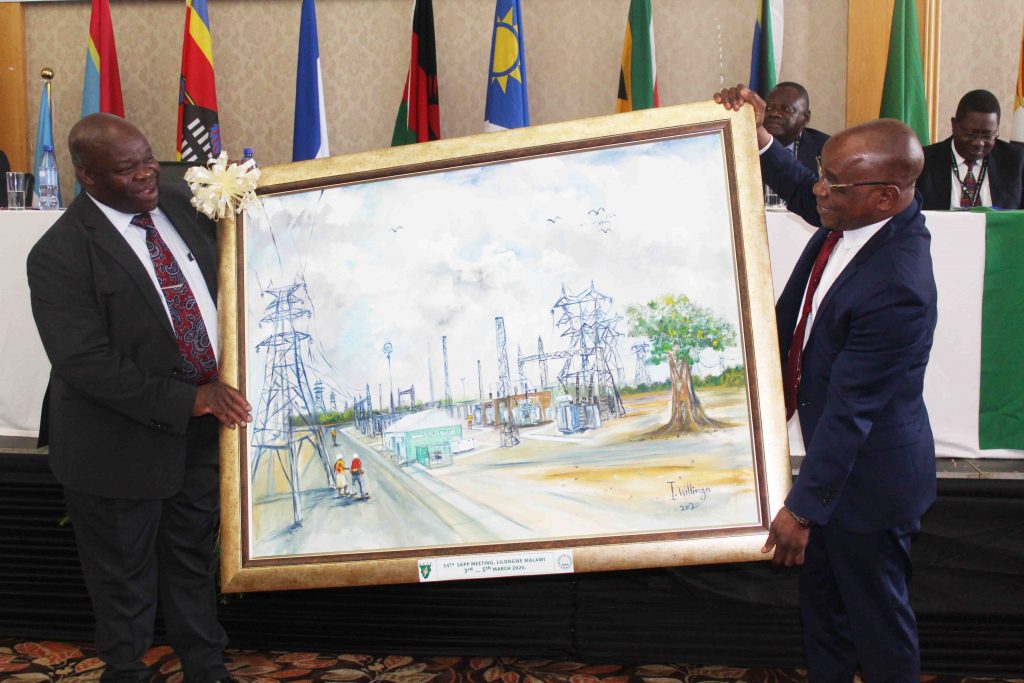
Energy
Kutsaira pushes for more power generation projects in Southern AfricaMarch 06, 2020 / Wahard Betha
Minister of Natural Resources, Energy and Mining Bintony Kutsaira has stressed the need for the Southern Africa Power Pool (SAPP) member states to develop more power generation projects to ensure that the region has adequate power to support economic development.
Kutsaira made the remarks when he officially launched this year’s 54th SAPP meetings in Lilongwe.
He said the generation of adequate power can spearhead development projects that help in boosting economies in the Southern Africa Development Community (SADC) member states where power shortfalls are rampant.
He said: “In order to keep pace with developments taking place in our countries, it is incumbent upon us, as countries, to invest in electricity supply infrastructure more-so to avoid power deficits in future.”
“The SADC region’s economies are continuing to grow in fulfilment of the SADC industrialisation thrust and hence the region needs more power.”
Kutsaira encouraged experts in the energy sector to continue applying their efforts to harness solutions that will keep the lights on, commerce ticking, industry running and agriculture flourishing even in these challenging environments.
He stressed that electricity remains one of the critical driving forces for economic development and that the experts are at the centre of making it work.
Kutsaira urged SAPP to put in place enough measures to attract independent power producers (IPPs) to invest in the region.
He said it is a welcome development that SAPP already started enticing IPPs through revising membership categories to allow IPPs to participate in electricity trading in SAPP.
“I, therefore, urge you, SAPP member states, to continue to cooperate with these new players so that together you pursue the goal of providing reliable, sustainable and affordable power to all our citizens in the SADC Region,” he said.
Kutsaira also said Malawi is looking forward to becoming a beneficiary of SAPP through the Mozambique-Malawi Power Interconnector Project which is on course.
ESCOM CEO Alexon Chiwaya said Malawi is ready for the interconnector having improved its transmission and distribution infrastructure using financing from the Millennium Challenge Corporation (MCC) of the US Government.
“Through the MCC Malawi Compact, we recorded an improvement in the system infrastructure including: construction of 200MVA 400/132kV Phombeya and Nkhoma Substations and; a 400kV transmission line from Phombeya to Nkhoma,” said Chiwaya.
The Phombeya Substation will be the landing point for the 400kV Mozambique-Malawi Interconnection whilst the Nkhoma Substation will be the landing point for the 400kV Zambia-Malawi Interconnection.
He also thanked the World Bank for the financial support rendered through the Energy Sector Support Project (ESSP) which greatly assisted in the reinforcement of the transmission and distribution networks.
SAPP has nine interconnected countries, with a commitment to connect the remaining three member countries, namely Angola, Tanzania and Malawi.
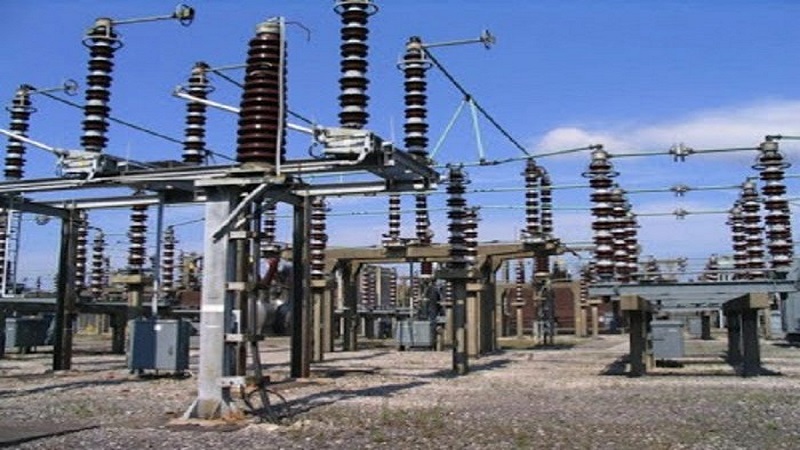
Energy
ESCOM to host regional power pool meetingMarch 02, 2020 / Wahard Betha
The Electricity Supply Corporation of Malawi (ESCOM) will on March 3 to 5, 2020 host the 54th Southern Africa Power Pool (SAPP) meeting at Bingu International Convention Centre in Lilongwe.
A press statement released by ESCOM says that the meeting will attract local and foreign key stakeholders to deliberate on issues hindering power generation and supply in the southern part of Africa.
“This Meeting will draw together about 150 experts from 12 member states in the Southern Africa Development Community (SADC) to discuss issues affecting the electricity sector, such as planning, operations, power trading and environment,” reads the statement.
The meeting comes at a time ESCOM is working on the construction of the Mozambique-Malawi Power Interconnector which will cement its place as an operating member of the power pool.
Escom considers membership of the power pool which will enable Malawi to share electricity with other SADC member states as an opportunity to ensure continuous supply of power amid numerous climate change related challenges that are disrupting supply forcing the utility to supply only 351 MW against a peak demand of 500 MW.
Malawi power supply challenges include flooding that results in siltation and low water levels which reduce capacity of electricity generation equipment.
Through the power pool, Malawi also hopes to start exporting electricity to the region in future as the Electricity Generation Company (EGENCO) is pursuing several projects to increase its power supply capacity.
The projects on the cards include expansion of Wvowe Mini Hydropower Scheme from 4.5 MW to 9MW; the 20MW solar power project at Nanjoka in Salima, the 180MW Songwe Hydropower Project on Songwe River; the 138MW Kholombidzo Hydroelectric Power Plant on Shire River, the 309MW Mpatamanga Hydro Power Plant and a Coal Fired Plant.
SAPP was created in August 1995 at the SADC summit in Kempton Park, South Africa, when member governments of SADC (excluding Mauritius) signed an Inter-Governmental Memorandum of Understanding (MoU) for the formation of an electricity power pool in the region under the name of the Southern African Power Pool.
The Ministers responsible for energy in the SADC region signed the Revised Inter-Governmental MoU in February 2006.
SAPP was organized under the visions of: facilitating the development of a competitive electricity market in the SADC region; giving the end user a choice of electricity supplier; ensuring that the southern African region is the region of choice for investment by energy intensive users and; guaranteeing sustainable energy developments through sound economic, environmental and social practices.
The body serves to provide a forum for the development of a world class, robust, safe, efficient, reliable and stable interconnected electrical system in the southern African region; coordinate and enforce common regional standards of quality of supply, measurement and monitoring of systems performance; facilitate the development of regional expertise through training programmes and research and; increase power accessibility in rural communities.
The SAPP is governed by four agreements: the Inter-Governmental Memorandum of Understanding which enabled the establishment of SAPP; the Inter-Utility Memorandum of Understanding, which established SAPP’s basic management and operating principles; the Agreement between Operating Members which established the specific rules of operation and pricing; and the Operating Guidelines, which provide standards and operating guidelines.
The SAPP has twelve member countries represented by their respective electric power utilities organized through SADC.
SAPP has four working committees: the Environmental Sub-Committee, the Markets Sub-Committee, the Operating Sub-Committee and the Planning Sub-Committee under a Management Committee which in turn reports to the Executive Committee.
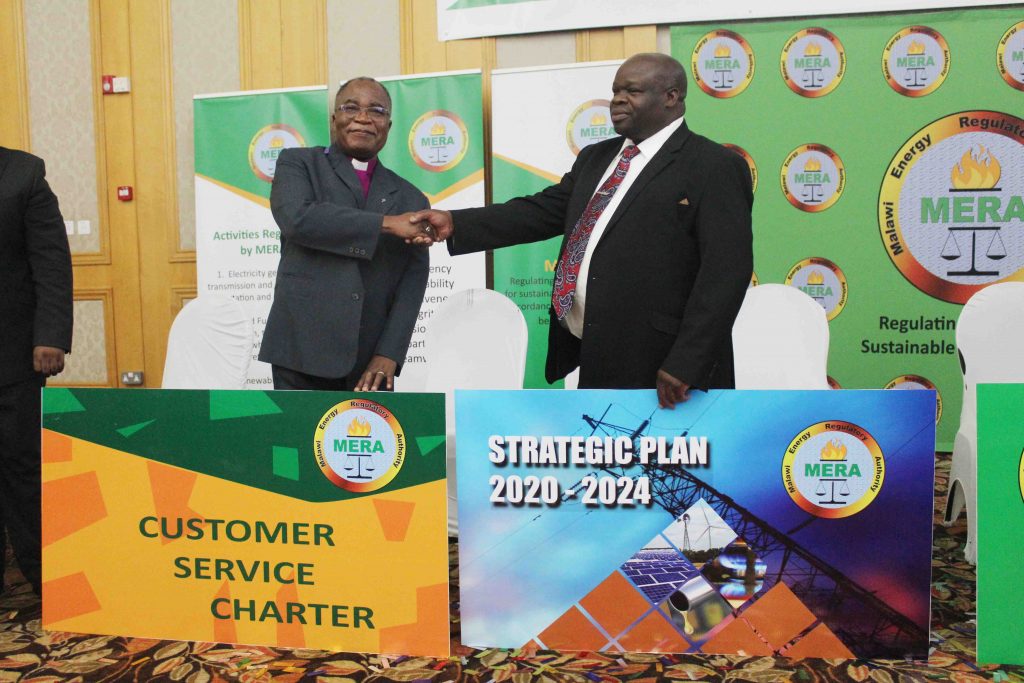
Energy
MERA focuses on stakeholder aspirations in new strategic planFebruary 13, 2020 / Wahard Betha
The Malawi Energy Regulatory Authority (MERA) says it is set to meet the needs and expectations of various stakeholders in Malawi through implementation of its third Strategic Plan and Customer Service Charter for the period of 2020 to 2024.
Speaking in Lilongwe during the launch of the strategic plan and customer services charter, Board Chairperson for MERA Joseph Bvumbwe said the strategic plan articulates the vision, mission, core values and an implementation matrix that will help the body to focus on the terms to deal with expectations during the four years.
“During the four years MERA will focus on the following priorities that have been termed as strategic pillars: positive contribution towards an energy secure nation; financial sustainability; efficient and effective service delivery; and public trust,” Bvumbwe said.
Stakeholder’s expectations include: timely processing of applications; strict enforcement of Performance and Safety Standards; continuous professional development of energy industry players; consistency in the enforcement of regulations; enhanced information communication and education of stakeholders especially regarding to MERA roles and functions; and improved efficiency in operations.
Bvumbwe said MERA desires that regulation of the industry should result into predictable and reliable energy supplies to ensure that the country has energy security in terms of supply, quality and distribution.
He stressed that during the planned four-year period, MERA will make more efforts to increase and diversify its revenue base to achieve the estimated budget of MK36.2 billion for the implementation of the plan.
He said: “We shall strive to be efficient for effective service delivery and we shall adopt best practices and provide services in accordance with governing statutes.
“We desire to enhance our transparency, open communication, and demonstrate high standard of ethics.”
The Board the board has identified potential risks and strategies to mitigate any setbacks to reaching the desired destination.
He said launch of the MERA service Charter and 2020-2024 Strategic Plan is an important landmark for MERA, in particular, and the energy sector generally.
“The Board commits to work with the CEO, Management and staff to ensure that MERA works in such a way that is not only responsive to the needs of consumers and industry players but also facilitates the overall quality implementation of the Service Charter and Strategic Plan,” he said.
Bvumbwe pleaded for continued support and cooperation from the stakeholders stressing that that is the only way to make the plans have true meaning and bear results.
In his remarks, Minister of Natural Resources, Energy and Mining Binton Kutsaira, who was the Guest of Honour at the ceremony, said availability of adequate energy is a key catalyst to the country’s development and MERA is at the very heart of the solution to deal with energy crisis in the country.
Kutsaira said the strategic plan has come at an opportune time when Malawi’s energy sector is undergoing transformation as the country races towards a middle income status that requires more energy to power up economy.
He said: “The 2020-2024 MERA strategic plan has set out a comprehensive roadmap for reform of the energy sector. Its objectives are to ensure that the sector becomes more performance oriented, more flexible and more responsible.”
Kutsaira urged management of MERA to continue engaging with all stakeholders as they implement the plan.
Energy is of the key priority areas (KPAs) outlined in the Malawi Growth and Development Strategy III.
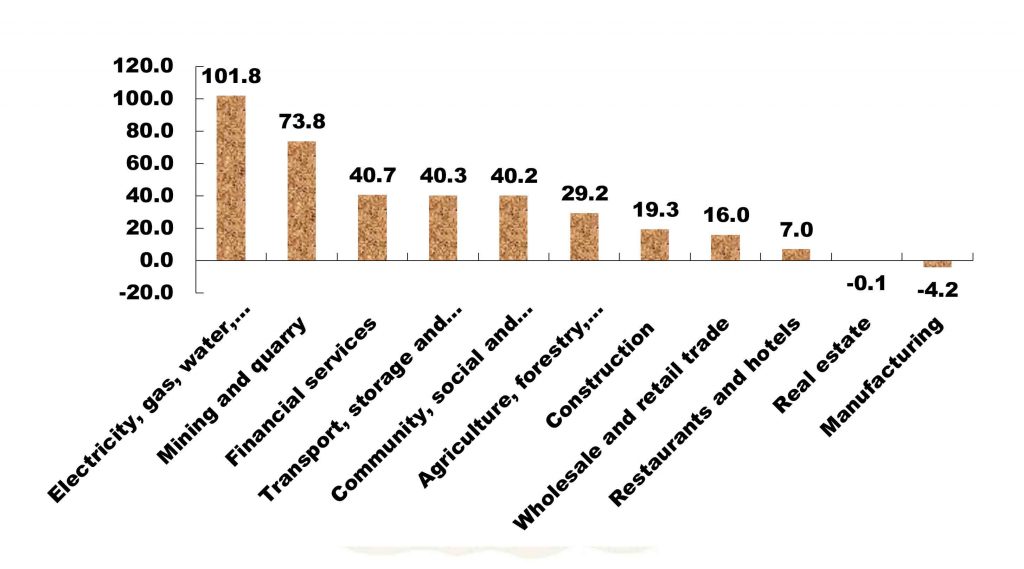
Energy
Energy, mining sectors register highest growth in 2019February 06, 2020 / Wahard Betha
Reserve Bank of Malawi’s (RBM) report released at the first 2020 meeting of the Monetary Policy Committee (MPC) shows that the sectors of energy and mining registered highest growth in the year 2019 due to continued expansion of private sector credit in the country.
The report indicates that the energy sector comprising electricity, gas and water registered 101.8% while mining and quarry registered 73.8% growth.
RBM Governor Dalitso Kabambe says the development was supported by reduction in the interest rates in the country.
Kabambe says: “Private sector credit grew by 21.3% in 2019 compared to 11.5% in 2018. This development was supported by reduction in interest rates. Apart from the traditional borrowers, notable expansions were observed in energy and mining sectors.”
He projects that oil prices in 2020 will remain broadly stable than the past year, with prospects of continued decrease in 2021.
Kabambe says the projection of Brent crude oil prices in 2020 is at average of US$58.0 per barrel compared to US$60.2 of 2019 expected to lower again to US$55.3 in 2021 despite mounting geopolitical tensions.
The report also unveils that real output in 2019 overwhelmingly increased with estimated growth of 5.0% from 4.0% in 2018 following the recovery in the agriculture sector.
“Real Gross Domestic Product (GDP) growth is projected between 5.0 and 6.0% in 2020 owing to further recovery in the agriculture sector as well as favourable macroeconomic conditions,” reads the report.
The report further says the food inflation remained in double digit throughout 2019 and averaged 14.3 percent compared to 9.8 percent in 2018 while non-food inflation remarkably decreased, averaging 5.4 percent in 2019 from an average of 9.0 percent in 2018.
It says the rise in food inflation was mainly driven by increase in maize prices while the decrease in non-food inflation is on account of relatively tight monetary conditions.
The other sectors that performed well in 2019 include: financial services at 40.7%, transport at 40.3%, agriculture and forestry at 29.2%, construction at 19.3%, trade 16.0% and restaurants and hotels at 7.0%.
However, the Kwacha exchange rate has been broadly stable during the past three years and was trading at an average of K738.8731 per US dollar as of December 2019.
The stability of the Kwacha is expected to continue in 2020 on the back of adequate foreign exchange reserves which stood at 4.1 months of imports at the end of December 2019.
During the meeting, (MPC) decided to maintain the Policy Rate at 13.5% and the Lombard Rate at 0.4 percentage points above the Policy Rate.
The Committee also maintained the Liquidity Reserve Requirement (LRR) on local currency deposits at 5%, and the LRR on foreign currency deposits at 3.75%.
The Committee observed that although rising maize prices are likely to continue pushing up headline inflation in the first quarter of 2020, the elevation is deemed temporary and does not pose significant risks to the medium-term inflation outlook.
The global economic growth for 2019 and 2020 have been marked down by 0.1 percentage points to 2.9% and 3.3% from the October 2019 projections of 3.0% and 3.4%, respectively.
The downward revision is on account of surprises to economic activity in some emerging market economies, notably India and social unrest in few other economies
The Reserve Bank of Malawi was established under an Act of Parliament in July 1964 (Chapter 44:02 Laws of Malawi) and started its operations in June, 1965 in Blantyre replacing a branch of the Federal Bank of Rhodesia and Nyasaland founded to serve as a central bank of the Federation of Rhodesia and Nyasaland.
At inception, the Bank had total assets amounting to K15.96 million with foreign assets amounting to K15.2 million an equivalent of £8.8 million, representing 18.1% of the federal currency which was redeemed in Malawi.































